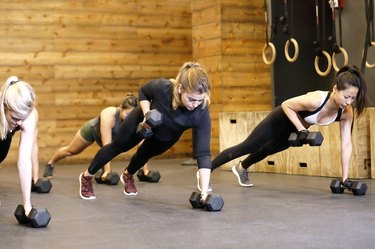
Whether or not you continue lifting while fasting will depend on the type of fast you are doing, your reasons for doing it and your current fitness level. Don't start a new weightlifting program during a fast — both your diet and your new physical activity level will strain your system.
Why Do You Fast?
Video of the Day
There are three main reasons why people choose to fast: cleansing, weight loss and spirituality. Fasting for religious reasons is thought to help people focus on the divine. Detox proponents argue that fasting allows your body time to clean house. Fasting to lose weight may provide rapid short-term weight loss, says Harvard Health Publishing.
Video of the Day
Different Kinds of Fasts
Each type of fast has different rules about what you can't eat and for how long. Some fasts last only a day. Ramadan, on the other hand, lasts a whole month, although it is not a complete fast. It requires individuals to refrain from eating or drinking nutrients during daylight hours.
Detox fasts may require you to eat and drink nothing at all for a few days, or you might be able to drink enough fruit and vegetable juice to add up to 2,000 calories.
Read more: Should I Exercise While Fasting?
What to Eat
If you are able to consume any calories during a fast, they will usually be mainly carbohydrates. Consuming some carbohydrates — like juice, rice and potatoes — helps you manage the demands of exercise better than a water-only fast. Proteins and fats are generally limited. A fast that doesn't even allow water is an extreme strain on the body.
If you choose a no-water fast, do so with great caution and stop exercising until you resume your normal eating pattern. During Ramadan, for example, you can drink your calories in the form of shakes or smoothies. And before sunup, consume a slow-digesting protein such as casein — found in Greek yogurt, milk or cottage cheese — that will take six to eight hours to digest.
Effects of a Fast
After a few days of fasting, your metabolism slows down. The body will also begin to use body fat, muscle and bone to get the nutrients it needs to keep you moving. The more you lift weights, the more stress you put on your muscles.
Without enough carbohydrate and protein in your diet, it is difficult to replace glycogen, and even harder to build new muscle. Intermittent fasting which could last for four hours, four days a week has been proven to have no deleterious effects on gains while strength training according to a September 2015 study in the Journal of the International Society of Sports Nutrition.
Risks and Ramifications
Fasting for a day or two usually doesn't harm a healthy person, but when a fast lasts for several weeks, it can have an impact on athletic performance. A fast can make you irritable and tired and can also affect blood sugar levels, notes the Mayo Clinic. This might make you dizzy or weaker than normal — so be sure to have a spotter if lifting free weights during a long fast.
Read more: What Happens If I Workout Without Eating?
What You Can Do
If you want to keep lifting while fasting, then consider using lower weights and working at a lower intensity to put less strain on your body. Don't try to focus on building muscle at this time. If your fasting plan allows you to consume juices, then drink them. If you can also add protein powder to one of your drinks, this may help avoid lean muscle mass — but this could also defeat the purpose of your fast.
- Journal of the International Society of Sports Nutrition: "Effect of Fed- Versus Fasted State Resistance Training During Ramadan on Body Composition and Selected Metabolic Parameters in Bodybuilders"
- Journal of the International Society of Sports Nutrition: "Intermittent Fasting Combined With Resistance Training: Effects on Body Composition, Muscular Performance, and Dietary Intake"
- Harvard Health Publishing: "Not so Fast: Pros and Cons of the Newest Diet Trend"
- Mayo Clinic: "Fasting Diet: Can It Improve My Heart Health?"